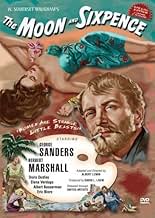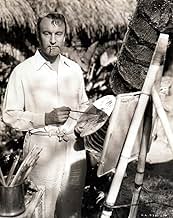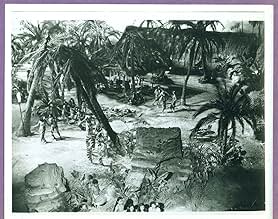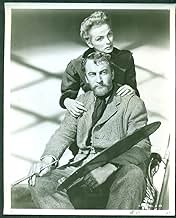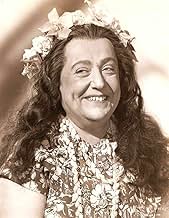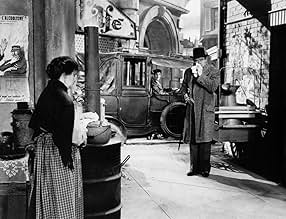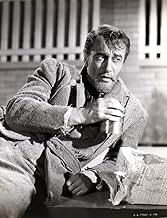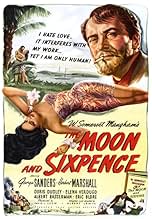अपनी भाषा में प्लॉट जोड़ेंLoosely inspired by Gauguin's life, the story of Charles Strickland, a middle-aged stockbrocker who abandons his middle-class life, his family, and his duties to start painting, as he has al... सभी पढ़ेंLoosely inspired by Gauguin's life, the story of Charles Strickland, a middle-aged stockbrocker who abandons his middle-class life, his family, and his duties to start painting, as he has always wanted to do. He is from then on a awful human being, wholly devoted to his ideal: be... सभी पढ़ेंLoosely inspired by Gauguin's life, the story of Charles Strickland, a middle-aged stockbrocker who abandons his middle-class life, his family, and his duties to start painting, as he has always wanted to do. He is from then on a awful human being, wholly devoted to his ideal: beauty.
- निर्देशक
- लेखक
- स्टार
- 1 ऑस्कर के लिए नामांकित
- 4 जीत और कुल 2 नामांकन
- Dirk Stroeve
- (as Steve Geray)
- Native Boy at Wedding
- (बिना क्रेडिट के)
- Man Seated in Paris Dive
- (बिना क्रेडिट के)
- Tiare's Cook
- (बिना क्रेडिट के)
- Party Guest
- (बिना क्रेडिट के)
- Maitland - Wolfe's Valet
- (बिना क्रेडिट के)
- The Leper
- (बिना क्रेडिट के)
- Col. Fred MacAndrew
- (बिना क्रेडिट के)
- Amy Strickland
- (बिना क्रेडिट के)
- Tough Bill
- (बिना क्रेडिट के)
- French Floozie
- (बिना क्रेडिट के)
फ़ीचर्ड समीक्षाएं
Sanders is perfectly cast as the insensitive and coldly indifferent Strickland who really just wants to be left alone. He asks for nothing but exploits kindness to its fullest when forced upon him, especially by the artist Stroeve. In a leading man of the era's hand the role would more than likely have been diluted and suffered but with Sanders you get a bored condescension and disdainful inflection like no other.
Unfortunately the rest of Sixpence lags a good distance behind Sander's spot on performance. Director Albert Lewin employs very little scope and camera movement with little attention payed to set design and lighting. The sepia tint of the film washes out in some scenes and was more than likely employed by Lewin to display Strickland's magnum opus at the end but even this disappoints.
Herbert Marshall is dry and drab as the narrator and the rest of the cast flat and stiff. Combined they lack the life and conviction to be found in Sander's performance which might have even soared further had Lewin applied the expressionistic flourishes to be found in his The Picture of Dorian Gray a far more successful picture with a less secure actor.
I recently saw this movie for the first time on TCM. It is one of the most "startling" and highly original movies I have seen from that era of filmmaking.
Almost never does a movie affect me emotionally--not only as I saw it but even a couple of weeks later I am still affected by it.
Among the many things that are so powerful is the relentless negativity of the George Sanders' character throughout. And yet he makes us feel he is on a mission to be true to himself and to fulfill his destiny without apology.
To combine these elements in one character is something I have never seen in any movie. It left me confused emotionally and yet felt admiringly of someone who can eschew all human concern for others(with one exception which I will not spoil) to relentlessly pursue what he perceives as his truth and destiny.
It is a brilliant achievement in George Sanders' acting and for the directors' unapologetic vision of the movie.
I have to be careful not to spoil, but among many amazing surprises is how another artists' wife(Blanche Stroeve played by Doris Dudley whom I knew in real life) reacts to Sanders after she, at her husband's insistence, nurses him back to health. It is an amazing scene. Yet somehow we understand that Sander's purpose is so well-defined and his masculinity is so caveman-like that she cannot help but respond to him.
Definitely not politically correct. I cannot imagine a scene like this even being allowed to be shot in this way in any modern movie.
Speaking of political correctness, other surprises abound in this area particularly during the time the Sanders character moves to Tahiti.
Not to spoil but listen closely as a certain older woman who interacts with Sanders describe her long ago love affairs and the character of the men she was involved with.
If any woman was to pine for love affairs like she describes in today's world, she would be denounced by every women's group on the planet. And yet she pines for those days with infectious gusto and enthusiasm.
A movie shot like this today would set women back a couple of hundred years. It could not be remade today and still retain all the wild political incorrectness. Protests and boycotts would stop the movie from being made if word got out of it's script's contents.
A great, emotionally draining, disturbing and thoroughly unique movie that will always stand alone and cannot be remade without huge rewrites.
One brief note of interest. One of the female leads, Doris Dudley, lived about a quarter mile from me in the early 1980's. The location was a little community called Jacobia, Tx. Her obituary says Greenville, Tx. which is also correct.
She invited me and my parents to some kind of little get together at her modest country home. She was outgoing, friendly and yet had a powerful energy to her that somehow made me understand why she was an actress.
She told me she was in the movies many years ago and her movie/stage name was Doris Dudley. She originally introduced herself as Doris Jenkins.
She mentioned that she knew Cary Grant. She may have said she worked with him but I'm not sure. She was in her mid 60's and long since retired from being an actress by the time I met her. She loved her dogs. And shortly after I met her she learned she had terminal cancer and died shortly thereafter. When I asked her about it, I was struck by how unafraid she was of dying. I brought her a little newspaper article about someone beating cancer I thought might cheer her up. But she did not need any help. Her courage in facing death infused me with courage. I shall never forget her.
There is only one biography of her I can find on the internet. She was a lovely, dynamic woman. She was terrific in this movie. I miss visiting with her.
It is an interesting film. Certainly a curiosity. The unusual use of different film stocks and the selective use of color make it a unique experience.
The subject of the film, a misanthropic painter who offers little in the way of redeeming value, makes the film an interesting story with a hollow center. Charles Strickland (George Sanders) is a man who sacrifices everything in life to retire to Tahiti to paint. Based loosely on the life of Gaugin, the film has an interesting cast of characters that surround Strickland, notably Herbert Marshall as Geoffrey Wolfe and Steven Geray as Dirk Stroeve.
One might feel compelled to watch the story of so unusual a protagonist, but he is not merely indifferent to others; he often goes out of his way to denigrate or insult them. When we finally see the artwork that has driven this man's obsession--if that's what it is--it is anticlimactic.
This work of fiction could have made Strickland a hero, fighting for his artistic vision. Instead, he comes across as little more than a craftsman who does even value his own work. This is disappointing.
क्या आपको पता है
- ट्रिवियाHerbert Marshall plays the writer Geoffrey Wolfe, a fictional alter ego of author W. Somerset Maugham. Marshall played Somerset Maugham in The Razor's Edge (1946), and appeared in several adaptations of Maugham's works, including The Painted Veil (1934) and both the 1929 and 1940 versions of The Letter (1940).
- गूफ़Strickland mispronounces Papeete (the capital of Tahiti) as "Pah-peet-ee". The correct pronunciation, as any resident of Tahiti would know, is "Pah-pay-ay-tay".
- भाव
Geoffrey Wolfe: Why will you never let me meet your husband?
Amy Strickland: He's not at all literary - he'd probably bore you to death.
Geoffrey Wolfe: Does he bore you?
Amy Strickland: I happen to be his wife: I'm very fond of him. He doesn't pretend to be a genius. In fact, he doesn't even make very much money on the stock exchange. But he's awfully good and kind.
Geoffrey Wolfe: I think I should like him very much.
- इसके अलावा अन्य वर्जनThere is a tinted and a color sequence toward the end of the film, both of which have recently been restored, but for many years this film was seen only in black-and-white.
- कनेक्शनReferenced in Spring in Park Lane (1948)
- साउंडट्रैकWe, Three Kings of Orient Are
(uncredited)
Traditional
टॉप पसंद
- How long is The Moon and Sixpence?Alexa द्वारा संचालित
विवरण
- रिलीज़ की तारीख़
- कंट्री ऑफ़ ओरिजिन
- भाषा
- इस रूप में भी जाना जाता है
- W. Somerset Maugham's The Moon and Sixpence
- उत्पादन कंपनी
- IMDbPro पर और कंपनी क्रेडिट देखें
बॉक्स ऑफ़िस
- बजट
- $4,01,000(अनुमानित)
- चलने की अवधि
- 1 घं 29 मि(89 min)
- पक्ष अनुपात
- 1.37 : 1

